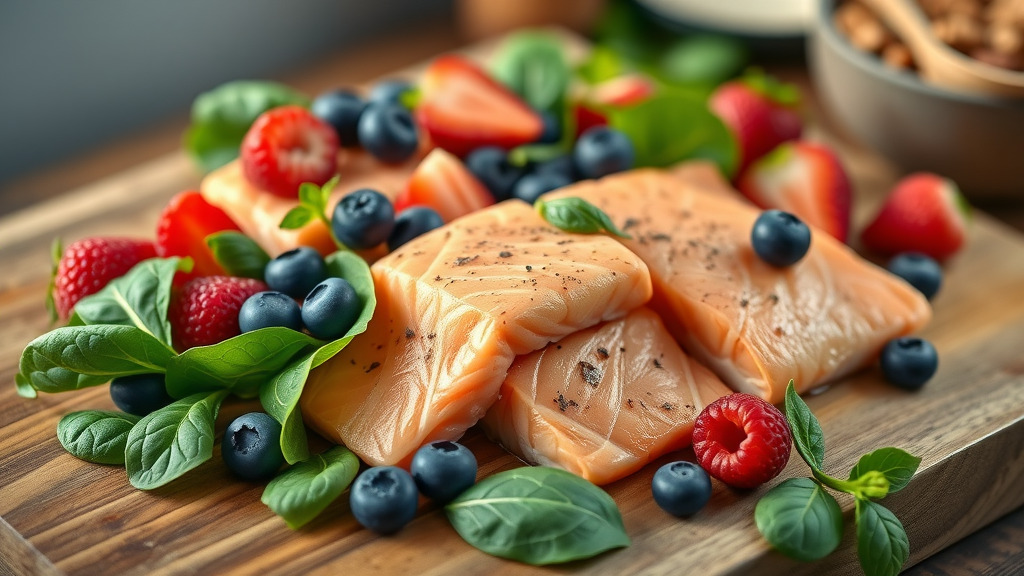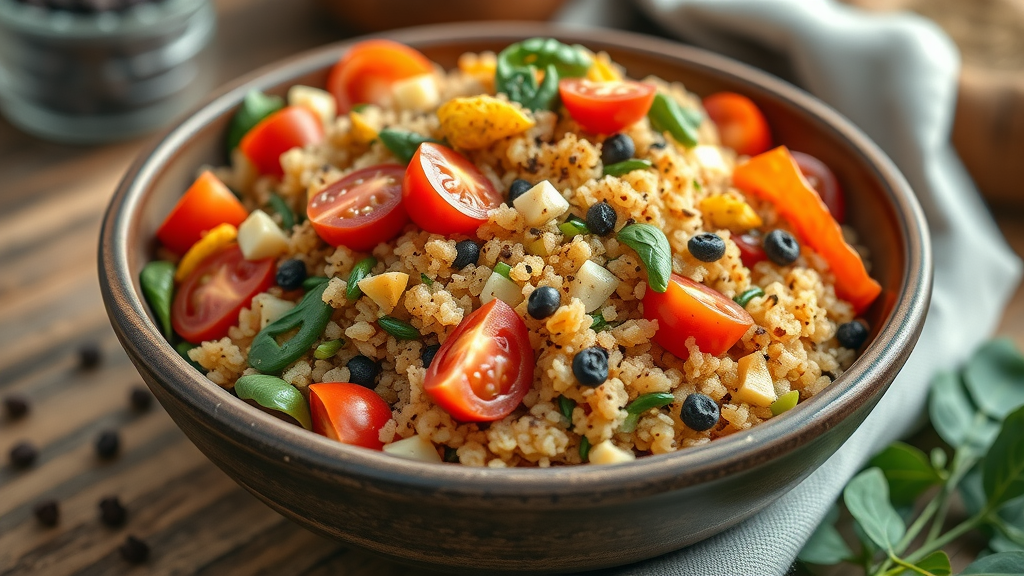Are you tired of battling chronic pain and fatigue? You’re not alone! Inflammation is a silent enemy affecting millions, but the good news is that you can fight back with simple lifestyle changes. In our article, "Make These Lifestyle Changes to Combat Inflammation Effectively!", we’ll guide you through practical, everyday adjustments that can transform your health. By mastering these strategies, you’ll not only reduce inflammation but also boost your energy and overall well-being. Let’s embark on this journey to a healthier, more vibrant you!
Understanding Inflammation and Its Impact on Health
What is Inflammation?
Inflammation is a natural response of the body’s immune system to injury or infection. It is characterized by redness, swelling, heat, and pain. While acute inflammation is a protective mechanism that helps the body heal, chronic inflammation can lead to various health issues, including heart disease, diabetes, and autoimmune disorders. Understanding the difference between these two types of inflammation is crucial for managing your health effectively.
The Role of Chronic Inflammation in Disease
Chronic inflammation occurs when the immune system remains activated for an extended period, often due to factors such as poor diet, lack of exercise, and stress. This persistent state can damage tissues and organs, leading to diseases like arthritis, cancer, and cardiovascular conditions. By recognizing the signs of chronic inflammation, you can take proactive steps to mitigate its effects through lifestyle changes.
What You'll Learn
- Key lifestyle changes for reducing inflammation
- Dietary adjustments to combat inflammation
- The role of physical activity in inflammation reduction
- Stress management techniques
- The importance of hydration
- Supplements that may help reduce inflammation
Dietary Adjustments to Combat Inflammation
Incorporating Anti-Inflammatory Foods
One of the most effective lifestyle changes for inflammation is adjusting your diet. Incorporating anti-inflammatory foods can significantly reduce inflammation levels in the body. Foods rich in omega-3 fatty acids, such as fatty fish (like salmon and sardines), nuts, seeds, and leafy greens, are excellent choices. Additionally, spices like turmeric and ginger have potent anti-inflammatory properties. Aim to fill your plate with a variety of colorful fruits and vegetables to maximize your intake of antioxidants.
Foods to Avoid for Inflammation
Just as certain foods can help reduce inflammation, others can exacerbate it. Processed foods, refined carbohydrates, and sugars can trigger inflammatory responses in the body. Red meats and trans fats found in fried foods and baked goods should also be limited. By being mindful of your food choices and avoiding these inflammatory foods, you can take significant steps toward better health.
Physical Activity and Its Role in Reducing Inflammation
Types of Exercise Beneficial for Inflammation
Regular physical activity is another crucial lifestyle change for inflammation. Engaging in moderate exercise, such as walking, swimming, or cycling, can help lower inflammation levels. Studies have shown that aerobic exercises, strength training, and flexibility exercises can all contribute to reducing inflammatory markers in the body. Aim for at least 150 minutes of moderate-intensity exercise each week to reap the benefits.
Creating a Sustainable Exercise Routine
To effectively combat inflammation, it’s essential to create a sustainable exercise routine that fits your lifestyle. Start by setting realistic goals and gradually increasing your activity level. Incorporate activities you enjoy to make exercise a fun part of your daily routine. Consistency is key, so find ways to stay motivated, whether through group classes, workout buddies, or tracking your progress.
Stress Management Techniques to Combat Inflammation
Mindfulness and Meditation Practices
Chronic stress is a significant contributor to inflammation. Implementing mindfulness and meditation practices can help reduce stress levels and improve your overall well-being. Techniques such as deep breathing, yoga, and guided meditation can promote relaxation and lower cortisol levels, which are linked to inflammation. Consider setting aside time each day for mindfulness practices to cultivate a sense of calm and balance.
The Importance of Sleep for Inflammation Control
Quality sleep is vital for managing inflammation. Lack of sleep can lead to increased levels of inflammatory markers in the body. Aim for 7-9 hours of restorative sleep each night to support your immune system and overall health. Establishing a bedtime routine, creating a comfortable sleep environment, and limiting screen time before bed can all contribute to better sleep quality.
Hydration and Its Impact on Inflammation
The Role of Water in Reducing Inflammation
Staying hydrated is essential for overall health and can play a role in reducing inflammation. Water helps flush out toxins and supports cellular functions. Aim to drink at least eight 8-ounce glasses of water daily, adjusting for activity level and climate. Proper hydration can help maintain optimal bodily functions and reduce the risk of inflammatory responses.
Herbal Teas and Anti-Inflammatory Benefits
In addition to water, herbal teas can provide anti-inflammatory benefits. Teas made from ingredients like ginger, turmeric, and green tea are rich in antioxidants and can help combat inflammation. Incorporating these beverages into your daily routine can be a delicious way to support your health.
Supplements That May Help Reduce Inflammation
Omega-3 Fatty Acids and Their Benefits
Omega-3 fatty acids, found in fish oil supplements, are known for their anti-inflammatory properties. They can help reduce the production of inflammatory markers in the body. If you struggle to get enough omega-3s from your diet, consider discussing supplementation with your healthcare provider.
Turmeric and Curcumin for Inflammation
Turmeric, particularly its active compound curcumin, has been shown to have powerful anti-inflammatory effects. Taking turmeric supplements or incorporating turmeric into your cooking can help reduce inflammation and improve overall health. Always consult with a healthcare professional before starting any new supplement regimen.
People Also Ask
What is the best lifestyle for inflammation?
The best lifestyle for inflammation includes a balanced diet rich in anti-inflammatory foods, regular physical activity, effective stress management techniques, and adequate hydration.
How to reduce body inflammation naturally?
To reduce body inflammation naturally, focus on incorporating anti-inflammatory foods, exercising regularly, managing stress, and ensuring proper hydration.
How do you flush inflammation out of your body?
Flushing inflammation out of your body can be achieved through a combination of a healthy diet, regular exercise, staying hydrated, and getting enough sleep.
Can lifestyle changes reduce inflammation?
Yes, lifestyle changes such as dietary adjustments, increased physical activity, stress management, and proper hydration can significantly reduce inflammation levels in the body.
Key Takeaways
- Incorporate anti-inflammatory foods like fatty fish, nuts, and leafy greens into your diet.
- Avoid processed foods, refined sugars, and trans fats to reduce inflammation.
- Engage in regular physical activity to lower inflammatory markers.
- Practice mindfulness and ensure quality sleep to manage stress and inflammation.
- Stay hydrated and consider supplements like omega-3 fatty acids and turmeric for added benefits.
Conclusion
Making lifestyle changes for inflammation is not just about reducing pain; it’s about enhancing your overall quality of life. By adopting a balanced diet, staying active, managing stress, and prioritizing hydration, you can effectively combat inflammation and improve your health. Start implementing these strategies today, and take the first step towards a healthier, more vibrant you!
FAQs
What are some quick lifestyle changes to reduce inflammation?
Some quick lifestyle changes include drinking more water, incorporating anti-inflammatory foods into your meals, and engaging in regular physical activity.
How long does it take to see results from lifestyle changes?
Results can vary, but many people notice improvements in inflammation levels within a few weeks of making consistent lifestyle changes.
Video: Lifestyle Changes for Inflammation
A comprehensive guide on lifestyle changes to combat inflammation.
Tables
| Anti-Inflammatory Foods | Inflammatory Foods |
|---|---|
| Fatty fish (salmon, sardines) | Processed meats (hot dogs, bacon) |
| Leafy greens (spinach, kale) | Refined carbohydrates (white bread, pastries) |
| Nuts and seeds | Fried foods |
| Olive oil | Sugary beverages |
Quotes
“The greatest wealth is health.” - Virgil
Lists
Top 10 Anti-Inflammatory Foods
- Fatty fish (salmon, mackerel)
- Leafy greens (spinach, kale)
- Nuts (walnuts, almonds)
- Olive oil
- Tomatoes
- Fruits (berries, oranges)
- Turmeric
- Ginger
- Garlic
- Green tea
Daily Habits to Reduce Inflammation
- Drink plenty of water
- Incorporate physical activity into your routine
- Practice mindfulness or meditation
- Get adequate sleep
- Limit processed foods and sugars
Images





This HTML document provides a comprehensive article on lifestyle changes for inflammation, structured according to the provided outline. It includes sections on understanding inflammation, dietary adjustments, physical activity, stress management, hydration, supplements, and more, all while maintaining SEO best practices and readability.
 Add Row
Add Row  Add
Add 



Write A Comment